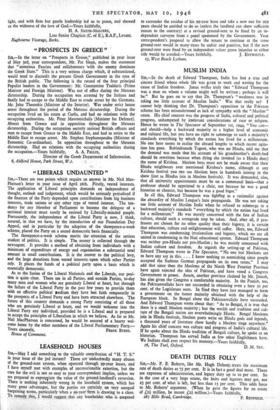MUSLIM INDIA
Sm,—In the death of Edward Thompson, India has lost a true and sincere friend whose whole life was given to work and writing for the cause of Indian freedom. Janus writes truly that "Edward Thompson was a man on whom a volume might well be written ; perhaps it will be." But he goes on to say that Dr. Thompson's " weakness was in taking too little account of Muslim India." Was that really so? I cannot help thinking that Dr. Thompson's opposition to the Pakistan scheme has been misunderstood as lack of sympathy with the " Muslim" cause. His chief concern was the progress of India, cultural and political progress, unhampered by irrelevant considerations of race or religion. Hence he wrote in The Spectator of September 1st, 1944, "You can— and should—help a backward majority to a higher level of economic and cultural life, but you have no right to submerge to such a majority's standards everything by which the nation has lived for a millennium. No one here seems to realise the absurd lengths to which recent agita- tion has gone. Rabindranath Tagore, who was no Hindu, told me that the demand was made that his account of his grandmother's death-bed should be rewritten because when dying she invoked (as a Hindu does) the name of Krishna. Moslem boys must not be made aware that their Hindu neighbours ever mentioned Krishna's name, although at any Krishna festival you can see Moslem boys in hundreds joining in the show (just as Hindus join in Moslem festivals). It was demanded, also, that all university appointments must be on a communal basis—that a professor should be appointed to a chair, not because he was a good historian or chemist, but because he was a good bigot."
In all this, Edward Thompson was fighting as a rationalist against the absurdity of Muslim League's hate propaganda. He was not taking too little account of Muslim India when he refused to submerge to a backward majority's standards " everything by which the nation had lived for a millennium." He was merely concerned with the fate of Indian culture, should such a retrograde step be taken. And, after all, if pro- fessors are chosen for no other quality than their bigotry, it is certain that education, culture and enlightenment will suffer. Here, too, Edward Thompson was condemning irrationalism and bigotry, which we are all united in condemning in the Nazi educational system. Edward Thompson was neither pro-Hindu nor pro-Muslim ; he was mainly concerned with Indian culture and freedom. As regards the setting-up of Pakistan, Edward Thompson wrote in The Spectator, "No one but Moslems are to have any say in this. . . . I know nothing so astonishing since people accepted the Sudeten German propaganda on its own terms." I may add that since then the Moslems of the North West Frontier Province have again rejected the idea of Pakistan, and have voted a Congress Government to power. Assam, another province claimed by Mr. Jinnah, has also given the Congress a comfortable majority. In the Punjab, too, the Pakistanwallahs have not succeeded in obtaining even a bare so per cent. of the Legislature seats. In Sind they have just managed to form a government on the barest majority obtained with the help of the European block. In Bengal alone the Pakistanwallahs have succeeded. And Edward Thompson wrote about that: " As to Bengal, it is true that there is a small Moslem majority ; but the wealth and tradition and cul- ture of the Bengali nation are overwhelmingly Hindu. Bengal Moslems join in Hindu festivals, Moslem poets write on Hindu gods and legends, a thousand years of literature show hardly a Moslem tinge anywhere." Again his chief concern was culture and progress of India's cultural life. If he spoke about the Hindu tradition of Bengali culture, he spoke as an historian. Thompson has served India as few other Englishmen have. We Indians shall ever respect his memory.—Yours faithfully,


























 Previous page
Previous page